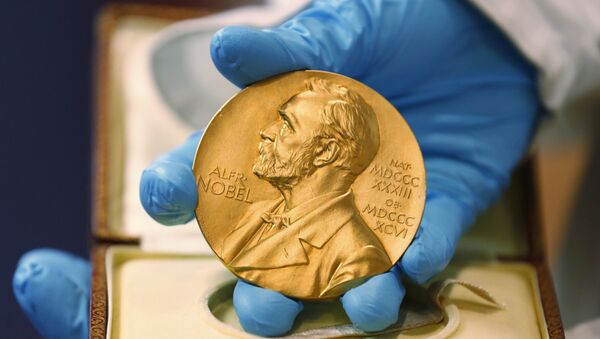The most striking instance of such dubious decisions, obviously omitted by Aftenposten, is when US President Obama was awarded the Nobel Peace Prize in 2009. The award's prestige was subsequently questioned: his pugnacious Democrat administration, which waged more wars than his Republican predecessor George Bush, failed to live up to Obama's peaceable rhetoric. However, there have been other historic errors in the history of the Nobel Prize.
Chemical Warfare
However, the Nobel Committee failed to take into account Haber's role in chemical warfare during WWI. Haber was enthusiastic about Germany's military campaign, and played a major part the first major gas attack, which occurred in Ypres, Belgium in 1915. A total of 10,000 Allied soldiers were hit by the attack. Half of them died, while the rest suffered from temporary blindness.
Did death come as a surprise, did he shout for his mother in pain or fear? We''ll never know. #Belgium #Ypres #ttot https://t.co/swqAR65HCK pic.twitter.com/LZxujPxlW8
— Nomad and Villager (@Nomad_Villager) October 2, 2016
Fake Cancer
Danish physician and pathology professor Johannes Fibiger received the Nobel Prize in medicine in 1926 for discovering that roundworm caused cancer in rats. According to Fibiger's research, rodents developed cancer by ingesting worm larvae when eating cockroaches.
Later it was found that cancer in rats was caused by a lack of vitamin A, whereas their diet of larvae turned out to be unimportant.
Dangerous Pesticides
Swiss chemist Paul Müller received the 1948 Nobel Prize in medicine for having discovered new usages of the DDT pesticide. The agent was claimed to be highly effective in eradicating flies, mosquitoes, beetles and other insects that could be potentially harmful to crops and transmit diseases such as malaria and typhus to humans. This use of DDT was claimed to have saved hundreds of thousands of lives and led the eradication of malaria in southern Europe.
However, environmentalists in the 1960s found that DDT poisoned wildlife and environment. Later, a worldwide ban on agricultural use was formalized under the Stockholm Convention on Persistent Organic Pollutants.
via National Geographic: DDT #Pesticide Linked to Fourfold Increase in Breast #Cancer Risk: https://t.co/ZUNz0tsh7V pic.twitter.com/qR6noF83qm
— Farm Fairy Crafts (@FarmFairyCrafts) September 18, 2016
Lobotomies
Portuguese doctor António Egas Moniz was awarded the 1949 Nobel Prize in medicine for developing lobotomy as a surgical treatment for mental disorders.
Lobotomies were widely practiced in psychiatric therapy in the 1940s, with tens of thousands of operations being performed yearly. Following the introduction of antipsychotic medications in the mid-1950s, lobotomies were quickly and almost completely abandoned.
What frontal leucotomy looks like on a CT scan https://t.co/fdnewROC07
— Vaughan Bell (@vaughanbell) January 22, 2016
This largely controversial method, which involves cutting or scraping away most of the connections to and from the prefrontal cortex in the frontal lobes of the brain, proved to have severe side-effects, with patients suffering from serious brain injuries. Today, lobotomies are practiced very seldomly.
In 1949, #EgasMoniz won the #NobelPrize for inventing #lobotomies; 60 years later #BarackObama won the prize for politically perfecting them
— Russ Lindquist (@russlindquist) October 1, 2016
Ignoring the Worthy
Indian politician and philosopher Mahatma Gandhi is considered some of the world's foremost advocates of non-violence, an idea which he took as a clue from Russian writer Leo Tolstoy. Despite being nominated for the Nobel Peace Prize five times, Gandhi never won.
The Nobel Committee, which is not in the habit of acknowledging its mistakes, later admitted that not awarding Gandhi clearly was an omission. In 1989, when the Dalai Lama was awarded the prize, Chairman of the Norwegian Nobel Committee Egil Aarvik said that the prize should also be seen as a tribute to Mahatma Gandhi.
Thank you Mahatma #Gandhi for inspiring us with your words & actions. Born 147 years ago today. pic.twitter.com/PNL07KNowD
— (RED) (@RED) October 2, 2016
In 1895, Alfred Nobel signed his last will and testament, giving the largest share of his fortune to a series of prizes in Physics, Chemistry, Physiology or Medicine, Literature and Peace, which later became known as the Nobel Prizes.




